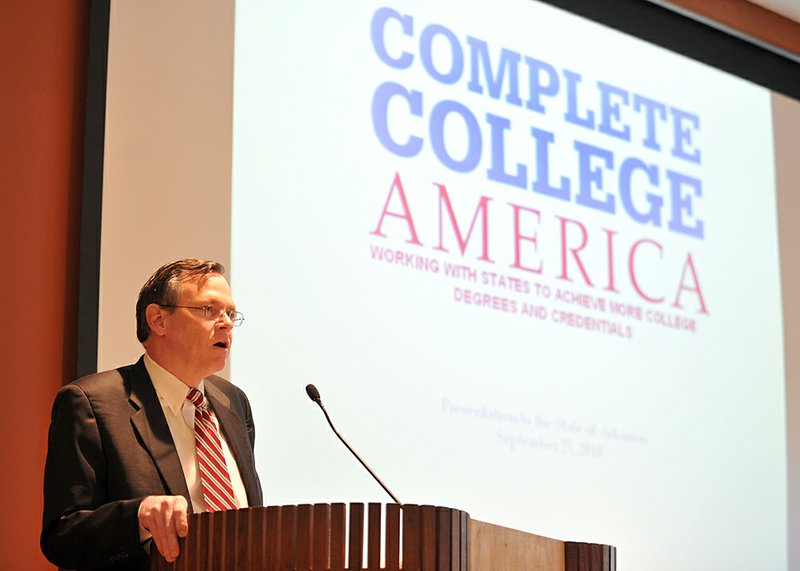FAYETTEVILLE — Arkansas has failed to produce enough college graduates to increase personal income or create a strong economy for the past 30 years, said Dennis Jones, National Center for Higher Education Management Systems president.
“This is about retention. The question is how do you get the focus to get students through [school]?” Jones said.
Jones addressed members of the state Higher Education Subcommittee of the Arkansas Legislative Council at the Fayetteville Public Library on Saturday morning.
Lawmakers continue to struggle to fix a higher-education system that encourages enrollment but doesn’t produce the needed number of degrees to create jobs, raise the state’s standard of living or build a strong economy, officials said.
Only 37.6 percent of students who enrolled in a public, four-year university in Arkansas in 2004 graduated from the same school by 2009, according to statistics from the state Higher Education Department. The national average is 54.3, including public and private four-year schools. Without systemic change, Arkansas will likely rank 51st - behind 49 states and Washington, D.C. - in creating jobs by 2018, Higher Education Director Jim Purcell said.
To pull out of the downward spiral, the state created a task force three years ago that outlined recommendations and goals. The state also enacted a law that allows the Higher Education Department to reward colleges for course completion among students and hired Complete College America, a nonprofit, to analyze strategies for increasing enrollment.
On Saturday, Rep. Johnnie Roebuck, D-Arkadelphia, announced plans for a study to review the role that state laws and allocations play in keeping graduation rates low.
“We really need to see what policies are barriers and what policies are incentives” for universities, Roebuck said.
The national center’s officials will begin calling institutions and interviewing officials to see what needs to happen in state law to change the current conditions. Jones said policies at the state and institutional levels need to change.
The Higher Education Department is using two $15,000 grants and another $15,000 from the Winthrop Rockefeller Foundation to pay for the report.
The report will include analysis on economic development efforts, costs to students to reach competitiveness should the state not produce further funding and results of forums involving officials in government, business and education statewide.
“It’s all about changing the culture from the top down,” Roebuck said.
The complete package, including Complete College America, is $50,000.
Roebuck expects the center’s final report by December, in time for the 2011 legislative session.
Roebuck was behind Act 797 to allow the state to distribute 20 percent of newmoney based on course completion, not just enrollment figures, but no new money has been allotted to the fund.
“It’s a worthless piece of legislation if we don’t move it forward and put more teeth in it,” Roebuck said.
The law provides little incentive for change, but lays the groundwork to encourage university chancellors and presidents to focus on graduation rates, Purcell said. Universities are already improving by just having the law, despite the fact that no financial incentives have materialized, he said.
Still, the current system encourages enrolling students en masse, taking students’ money but not encouraging graduation, Roebuck said. Universities and colleges saw a rise in enrollment numbers this year. The University of Arkansas at Fayetteville saw its largest enrollment in 64 years.
Yet, only 19.7 percent of students earn degrees in four years from four-year, public institutions, according to a 2007-08 report from the national center. Jones said four-year universities in Arkansas are severely underperforming.
“In essence, we’re just taking their money,” Complete College America President Stan Jones said. “In many cases, it’s a broken dream for so many people.”
Universities often offer too many course options without providing adequate guidance;hold classes at times when students find it difficult to juggle their school, family and work obligations; have excessive credit or transfer credit requirements; and use placement tests that provide little benefit. Placement tests don’t always predict academic success, Stan Jones said.
“There’s not a whole lot of evidence that remediation is that effective,” he said.
Arkansas is not using its resources well, Dennis Jones said. Other states, including Missouri, are getting more diplomas and certifications out of their public colleges and universities with the same amount of state money invested.
Unless something changes, Arkansas will remain at the bottom for economic development, and residents will continue to see depressed earnings, Dennis Jones said. The median earning for an Arkansan with a bachelor’s degree is $43,383, compared with the national rate of $50,919.
Job creation and higher education go hand in hand, Dennis Jones said. By the end of this decade, more than 60 percent of jobs will require college-level educations, Stan Jones said. Those without at least a high school diploma are unlikely to find any job at all.
“It’s not just a better job, it’s a job,” Dennis Jones said.
Arkansas, Pages 15 on 09/26/2010
